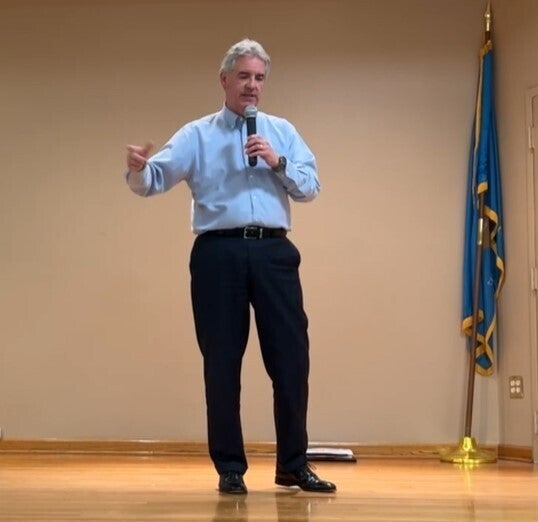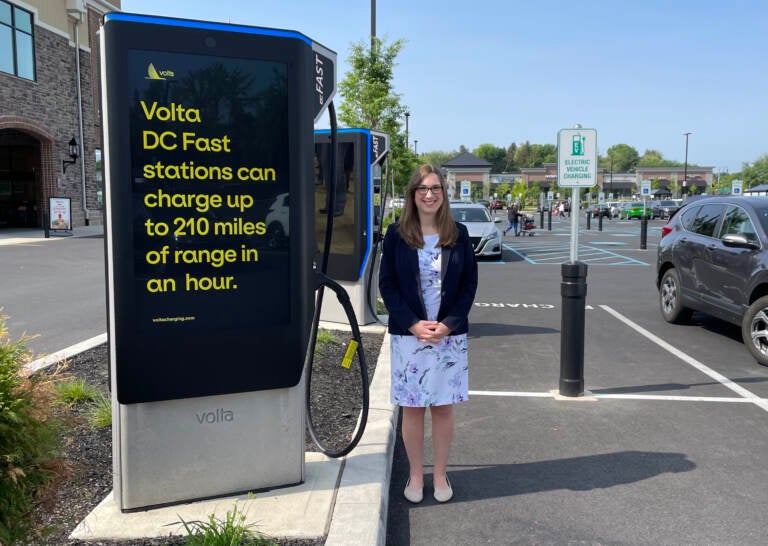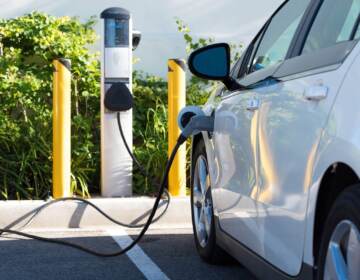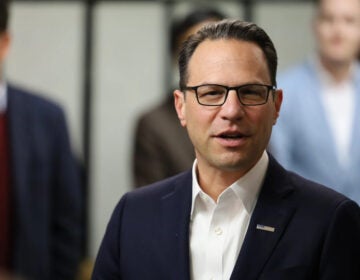‘All about accessibility’: Delaware offers $2,500 rebates for electric vehicle buyers and requires charging capability in new homes
The two new laws pave the way for more EVs on Delaware roads as advocates hope the state environmental secretary takes an even stronger step.
Listen 1:31
Dustyn Thompson of the Sierra Club with his 2023 Tesla Model 3, which cost $28,000 after federal and state rebates. It's his third electric vehicle. (Courtesy of Dustyn Thompson)
This story is part of the WHYY News Climate Desk, bringing you news and solutions for our changing region.
From the Poconos to the Jersey Shore to the mouth of the Delaware Bay, what do you want to know about climate change? What would you like us to cover? Get in touch.
Dustyn Thompson is on his third electric vehicle. He’s bought a Kia Soul, Nissan Leaf, and this year, a 2023 Tesla Model 3.
The Tesla’s sticker price was $38,000, but with a $7,500 federal tax credit and a $2,500 rebate from the state of Delaware, the electric-powered sedan cost him $28,000.
Thompson also has charging capability at home and says the electricity cost is minimal, certainly far lower than buying gasoline, which currently costs about $3.50 a gallon.
The Wilmington-area resident isn’t your average Delawarean, though. He heads the state’s chapter of the Sierra Club environmental protection group and is committed to being in the vanguard of the local effort to reduce emissions of harmful greenhouse gases, which trap heat in the atmosphere and contribute to global warming.
To that end, Thompson applauds two new electric vehicle-related laws that Gov. John Carney signed Thursday.
One law codifies a $2,500 rebate for Delaware residents who buy new EVs, and $1,000 for new plug-in hybrid vehicles, and for the first time extends the rebate to buyers of pre-owned vehicles. To qualify for the state rebate, the cost of the vehicle cannot exceed $50,000. Dozens of eligible vehicles are listed on the state’s website.
The other measure requires that starting in January, all new single-family homes statewide to have EV charging infrastructure. That means builders must add the necessary wiring, conduit, and junction box. That law also requires that starting in 2025, all new apartment and condominium complexes must have EV charging stations in 5% of parking spaces, with the charging infrastructure in another 10% of spaces.
Thompson also hopes the Carney administration follows through on its plan to adopt California’s Zero-Emission Vehicle program. The regulation would require that in 2035, all new cars, SUVs, and light trucks for sale at Delaware dealerships must be EVs. That number would start at 35% of new cars sold in 2026 and increase each year.
The proposal has generated pushback from Republican lawmakers, who held a series of town halls during the spring. Delaware environmental secretary Shawn Garvin, who has the ultimate say, is still mulling whether to adopt the regulation.

Delaware would be the 15th state to adopt the standard. Among Delaware’s neighbors, Maryland and New Jersey have adopted the rule, but Pennsylvania has not.
Thompson said the new laws and the California regulation are needed to cut the state’s dependence on vehicles with fossil fuel-burning internal combustion engines. Doing so on a local and global scale, he said, will help reduce emissions of carbon dioxide and other greenhouse gases and protect the state and the rest of the planet from devastating climate change.
“We have to move forward on a lot of different fronts all at one time and we have to do it immediately if we’re going to have any hope of saving the environment for future generations,’’ Thompson said. “Transportation is a huge part of that. Electrifying transportation is the current best way possible to reduce and eventually eliminate the impact” of greenhouse gas emissions.
He said the rebate, “if that’s all we were doing, is not even close to being enough. But if you combine that with making sure that when folks are ready to go EV that our infrastructure’s there, and you add in the [California regulations] to make sure the cars are on the lot, it all comes together to greatly impact the transportation portion of our emission portfolio.”
‘Making the electric vehicle choice truly accessible for people’
Despite opposition by most Republican members, the Democratic-sponsored EV rebate and charging infrastructure bills sailed through the General Assembly in late June.
Sen. Sarah McBride, a Wilmington-area Democrat and sponsor of both bills, said those measures and others the state took this year — gradually increasing the number of electric school buses and requiring new large commercial buildings to support solar energy infrastructure — will help the state gain traction in meeting goals for reducing emissions.
The new laws are “laying the foundation for inevitable shifts in both energy and in transportation that not just Delaware, but the world will see in the coming decades,’’ McBride said. “And so these bills are a critical way of making the electric vehicle choice truly accessible for people, regardless of their economic background.”
The state rebate program has been in place since 2015 and provided about $9 million to more than 4,000 buyers, according to the Department of Natural Resources and Environmental Control.
McBride said it’s more popular than ever, and the language of the law says it will remain in place until the median prices of EVs and gas-powered vehicles are comparable.
State Rep. Sophie Phillips, the lead sponsor of the rebate measure, says making it a law rather than a policy gives the program more heft and permanence.
“I decided to codify it because I wanted to make sure that people who have a lower income would be able to afford electric vehicles, or at least to make them more affordable with this rebate in addition to the federal rebate,’’ Phillips said.
One caveat in the new law is that it has a cap of $2 million, enough to provide rebates for the next 800 buyers of new EVs. But both Phillips and McBride said they are confident that if the money runs out, Carney, who leaves office in January 2025, or his successor, would work with lawmakers to allocate more money to keep the program going.
“We do have the ability to add more if we need it,’’ Phillips said. “It’s a very flexible program. So over time, if we see that we need to add to it, I know that we probably can.”

Buyers of new homes won’t have to upgrade electric panel
McBride said putting the charging infrastructure in new homes only makes the decision to purchase an EV easier, since buyers can simply plug in at night from their garage or driveway.
“Homeowners and renters moving forward don’t have to put forward significant amounts of money to retrofit their home to charge an electric vehicle,” McBride said.
A separate bill to require the state to assess the availability of residential charging stations statewide and develop plans to put in more around existing dwellings did not advance this legislative season.
Phillips seconded McBride’s sentiment.
“Building new homes with these things already in place is really helpful because the price of adding those later is really expensive. So it’s making sure that electric vehicles and all the equipment for charging is accessible.”
Adopting the California rule would be the icing on the cake, said Phillips, who represents the Bear area.
“If that does happen, that would make sure that we even have access to electric vehicles within the state, because right now we don’t really have that many here,’’ Phillips said.
“So a lot of people that want them have to go out of state to even test drive them, which becomes a problem if you are lower income and you do have multiple jobs. Finding that time to be able to go to another state to even test drive is a problem.”

Get daily updates from WHYY News!
WHYY is your source for fact-based, in-depth journalism and information. As a nonprofit organization, we rely on financial support from readers like you. Please give today.






